上海交通大学:《外国法专题(比较公司法)》课程教学资料(学生展示)The Global History of Corporate Governance
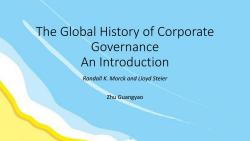
The Global History of Corporate Governance An Introduction Randall K.Morck and Lloyd Steier Zhu Guangyao
The Global History of Corporate Governance An Introduction Randall K. Morck and Lloyd Steier Zhu Guangyao
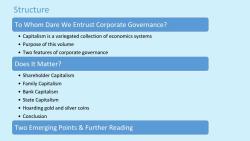
Structure To Whom Dare We Entrust Corporate Governance? Capitalism is a variegated collection of economics systems Purpose of this volume Two features of corporate governance Does It Matter? Shareholder Capitalism 。Family Capitalism 。Bank Capitalism ·State Capitalism Hoarding gold and silver coins 。Conclusion Two Emerging Points Further Reading
To Whom Dare We Entrust Corporate Governance? • Capitalism is a variegated collection of economics systems • Purpose of this volume • Two features of corporate governance Does It Matter? • Shareholder Capitalism • Family Capitalism • Bank Capitalism • State Capitalism • Hoarding gold and silver coins • Conclusion Two Emerging Points & Further Reading Structure
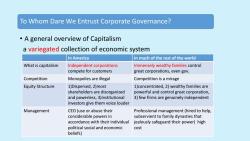
To Whom Dare We Entrust Corporate Governance? A general overview of Capitalism a variegated collection of economic system In America In much of the rest of the world What is capitalism Independent corporations Immensely wealthy families control compete for customers great corporations,even gov. Competition Monopolies are illegal Competition is a mirage Equity Structure 1)Dispersed,2)most 1)concentrated,2)wealthy families are shareholders are disorganized powerful and control great corporation, and powerless,3)institutional 3)few firms are genuinely independent investors give them voice louder Management CEO(use or abuse their Professional management(hired to help, considerable powers in subservient to family dynasties that accordance with their individual jealously safeguard their power)high political social and economic cost beliefs)
• A general overview of Capitalism a variegated collection of economic system In America In much of the rest of the world What is capitalism Independent corporations compete for customers Immensely wealthy families control great corporations, even gov. Competition Monopolies are illegal Competition is a mirage Equity Structure 1)Dispersed, 2)most shareholders are disorganized and powerless, 3)institutional investors give them voice louder 1)concentrated, 2) wealthy families are powerful and control great corporation, 3) few firms are genuinely independent Management CEO (use or abuse their considerable powers in accordance with their individual political social and economic beliefs) Professional management (hired to help, subservient to family dynasties that jealously safeguard their power) high cost To Whom Dare We Entrust Corporate Governance?
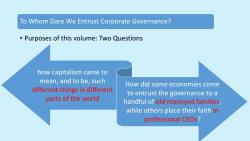
To Whom Dare We Entrust Corporate Governance? Purposes of this volume:Two Questions how capitalism came to mean,and to be,such How did some economies come different things in different to entrust the governance to a parts of the world handful of old moneyed families, while others place their faith in professional CEOs?
• Purposes of this volume: Two Questions To Whom Dare We Entrust Corporate Governance? how capitalism came to mean, and to be, such different things in different parts of the world How did some economies come to entrust the governance to a handful of old moneyed families, while others place their faith in professional CEOs?

To Whom Dare We Entrust Corporate Governance? Two features of corporate governance 1.corporate governance is entrusted to very different sorts of people and constrained by very different institutions THE RISE OF STATE CAPITALISM THE EMERGING WORLD'S NEW MODEL Mellon INVESTORS One Mellon Center Individual Wealthy Family Bank State
To Whom Dare We Entrust Corporate Governance? • Two features of corporate governance 1. corporate governance is entrusted to very different sorts of people and constrained by very different institutions Individual Wealthy Family Bank State
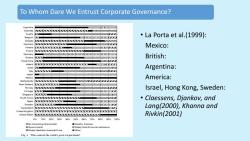
To Whom Dare We Entrust Corporate Governance? Argentina Australia Austria Belgium 。La Porta et al..(1999: Conada Denmark Finland Mexico: France Germany Greece British: Hong Kong Ireland tsrael Argentina: Italy Japan Mexlco America: Nethertands New Zealand Norway Israel,Hong Kong,Sweden: Portugal Singapore South Korea Claessens,Djankov,and Spain ■■■ Swedon ■■■■■■ Switzerland Z Lang(2000),Khanna and United Kingdom United States Rivkin(2001) 0% 10%20%30%40%50% 60%70%80%90%100% No Controlling Shareholder ■Wealthy Families Governments Widely Held Financial Institutions Widely Heid Non-financial Firms ☑Other Fig.I Who controls the world's great corporations?
• La Porta et al.(1999): Mexico: British: Argentina: America: Israel, Hong Kong, Sweden: • Claessens, Djankov, and Lang(2000), Khanna and Rivkin(2001) To Whom Dare We Entrust Corporate Governance?

To Whom Dare We Entrust Corporate Governance? Two features of corporate governance 2.the pyramidal business group magnifies the economic importance of this difference Single enough to create genuinely Co. different economic systems Listed structures that permit tiny Listed Co. Co. elites to control the greater parts of the corporate sectors
• Two features of corporate governance 2. the pyramidal business group magnifies the economic importance of this difference enough to create genuinely different economic systems structures that permit tiny elites to control the greater parts of the corporate sectors Single Co. Apex shareholder(wealthy family) Listed Co. Listed Co. …… To Whom Dare We Entrust Corporate Governance?

Does It Matter? Shareholder Capitalism Family Capitalism conclusion Bank Capitalism State Capitalism Hoarding gold and silver coins
Does It Matter? Shareholder Capitalism Family Capitalism Bank Capitalism State Capitalism Hoarding gold and silver coins conclusion
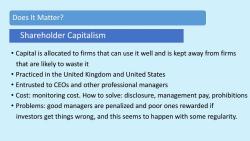
Does It Matter? Shareholder Capitalism Capital is allocated to firms that can use it well and is kept away from firms that are likely to waste it Practiced in the United Kingdom and United States Entrusted to CEOs and other professional managers Cost:monitoring cost.How to solve:disclosure,management pay,prohibitions Problems:good managers are penalized and poor ones rewarded if investors get things wrong,and this seems to happen with some regularity
• Capital is allocated to firms that can use it well and is kept away from firms that are likely to waste it • Practiced in the United Kingdom and United States • Entrusted to CEOs and other professional managers • Cost: monitoring cost. How to solve: disclosure, management pay, prohibitions • Problems: good managers are penalized and poor ones rewarded if investors get things wrong, and this seems to happen with some regularity. Shareholder Capitalism Does It Matter?
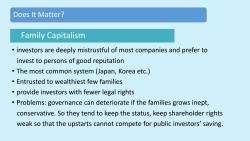
Does It Matter? Family Capitalism investors are deeply mistrustful of most companies and prefer to invest to persons of good reputation The most common system (Japan,Korea etc.) Entrusted to wealthiest few families provide investors with fewer legal rights Problems:governance can deteriorate if the families grows inept, conservative.So they tend to keep the status,keep shareholder rights weak so that the upstarts cannot compete for public investors'saving
• investors are deeply mistrustful of most companies and prefer to invest to persons of good reputation • The most common system (Japan, Korea etc.) • Entrusted to wealthiest few families • provide investors with fewer legal rights • Problems: governance can deteriorate if the families grows inept, conservative. So they tend to keep the status, keep shareholder rights weak so that the upstarts cannot compete for public investors’ saving. Family Capitalism Does It Matter?
按次数下载不扣除下载券;
注册用户24小时内重复下载只扣除一次;
顺序:VIP每日次数-->可用次数-->下载券;
- 上海交通大学:《外国法专题(比较公司法)》课程教学资料(学生展示)Shareholder Activism.pptx
- 上海交通大学:《外国法专题(比较公司法)》课程教学资料(学生展示)Regulatory Dualism.pptx
- 上海交通大学:《外国法专题(比较公司法)》课程教学资料(学生展示)LLSV.ppt
- 上海交通大学:《外国法专题(比较公司法)》课程教学资料(学生展示)Gender Diversity in Boards.pptx
- 上海交通大学:《外国法专题(比较公司法)》课程教学资料(学生展示)Enforcement(LIU Zhenzhen).ppt
- 上海交通大学:《外国法专题(比较公司法)》课程教学资料(学生展示)Enforcement(CAI Mengqi).ppt
- 上海交通大学:《外国法专题(比较公司法)》课程教学资料(学生展示)Employees.pptx
- 上海交通大学:《外国法专题(比较公司法)》课程教学资料(学生展示)Cross-listing.pptx
- 上海交通大学:《外国法专题(比较公司法)》课程教学资料(学生展示)CMS Structure.pptx
- 上海交通大学:《外国法专题(比较公司法)》课程教学资料(学生展示)Boards.pdf
- 上海交通大学:《外国法专题(比较公司法)》课程教学资料(学生展示)Agency cost.ppt
- 上海交通大学:《外国法专题(比较公司法)》课程教学资料_Reading Materials_Terms.pdf
- 上海交通大学:《外国法专题(比较公司法)》课程教学资料_Reading Materials_How Do Legal Rules Evolve.pdf
- 上海交通大学:《外国法专题(比较公司法)》课程教学资料_Laws & Rules_RO Rules 2011.pdf
- 上海交通大学:《外国法专题(比较公司法)》课程教学资料_Laws & Rules_PRC Partnership Enterprise Law.pdf
- 上海交通大学:《外国法专题(比较公司法)》课程教学资料_Laws & Rules_PRC COMPANY LAW.pdf
- 上海交通大学:《外国法专题(比较公司法)》课程教学资料_Laws & Rules_PRC Anti-Monopoly Law.pdf
- 上海交通大学:《外国法专题(比较公司法)》课程教学资料_Laws & Rules_M&A Rules.pdf
- 上海交通大学:《外国法专题(比较公司法)》课程教学资料_Laws & Rules_Investment Guidance Catalogue.pdf
- 上海交通大学:《外国法专题(比较公司法)》课程教学资料_Laws & Rules_Catalogue 2011(English & Chinese).pdf
- 上海交通大学:《外国法专题(比较公司法)》课程教学资料(学生展示)The Market for Corporate Law.ppt
- 上海交通大学:《外国法专题(比较公司法)》课程教学资料(学生展示)Values and Culture.ppt
- 上海交通大学:《经济法学》课程教学资源(案例)产品质量法案例.doc
- 上海交通大学:《经济法学》课程教学资源(案例)价格法案例.doc
- 上海交通大学:《经济法学》课程教学资源(案例)反不正当竞争法案例.doc
- 上海交通大学:《经济法学》课程教学资源(案例)反不正当竞争法案例补充.doc
- 上海交通大学:《经济法学》课程教学资源(案例)反垄断法案例.doc
- 上海交通大学:《经济法学》课程教学资源(案例)最高人民法院关于审理食品药品纠纷案件适用法律若干问题的规定.docx
- 上海交通大学:《经济法学》课程教学资源(PPT课件)第一章 经济法基本理论问题(上,李俊明).pptx
- 上海交通大学:《经济法学》课程教学资源(PPT课件)第二章 经济法基本理论问题(下,李俊明).pptx
- 上海交通大学:《经济法学》课程教学资源(PPT课件)第三章 国有资产法(李俊明).pptx
- 上海交通大学:《经济法学》课程教学资源(PPT课件)第四章 稅法——税法总论(李俊明).pptx
- 上海交通大学:《经济法学》课程教学资源(PPT课件)第五章 稅法——税法各论、所得税法律制度导读(李俊明).pptx
- 上海交通大学:《经济法学》课程教学资源(PPT课件)第六章 反垄断法(王先林).ppt
- 上海交通大学:《经济法学》课程教学资源(PPT课件)第七章 反不正当竞争法(王先林).ppt
- 上海交通大学:《经济法学》课程教学资源(PPT课件)第八章 消费者权益保护法(王先林).ppt
- 上海交通大学:《经济法学》课程教学资源(PPT课件)第九章 产品质量法(王先林).ppt
- 上海交通大学:《经济法学》课程教学资源(PPT课件)第十章 价格法(王先林).ppt
- 上海交通大学:《经济法学》课程教学资源(课件)第十一章 国有企业法(李俊明).pdf
- 上海交通大学:《经济法学》课程教学资源(课件)第十二章 财政法(李俊明).pdf
